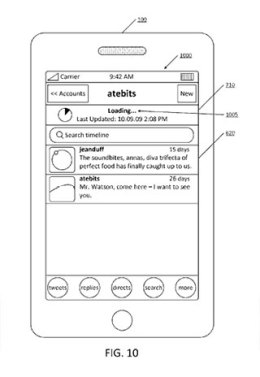
Loren Brichter's pull-to-refresh patent
Adam Messinger, Twitter’s top engineer, has blogged about a new concept that the company plans to implement and advocate for. It calls it the Innovator’s Patent Agreement:
The IPA is a new way to do patent assignment that keeps control in the hands of engineers and designers. It is a commitment from Twitter to our employees that patents can only be used for defensive purposes. We will not use the patents from employees’ inventions in offensive litigation without their permission. What’s more, this control flows with the patents, so if we sold them to others, they could only use them as the inventor intended.
This is a significant departure from the current state of affairs in the industry. Typically, engineers and designers sign an agreement with their company that irrevocably gives that company any patents filed related to the employee’s work. The company then has control over the patents and can use them however they want, which may include selling them to others who can also use them however they want. With the IPA, employees can be assured that their patents will be used only as a shield rather than as a weapon.
Reading Messinger’s words, I almost did a double-take. When news involving patents and Silicon Valley tech companies crops up, it almost always involves companies suing the pants off each other, often using patents for “inventions” that seem painfully obvious and/or vague. Twitter appears to be declaring a unilateral patent non-aggression pact with the rest of the world.
Twitter’s stance isn’t just of theoretical value. It owns a patent on the concept of “pull-to-refresh” — the gesture that lets you tug downwards in a mobile app to update a list. The patent is for an idea that originated with Loren Brichter, the software superstar whose Tweetie app was acquired by Twitter and used as the basis of its current iOS apps. Brichter is delighted with the IPA. That’s great news if it results in other software companies implementing pull-to-refresh without fear of legal repercussions.
As blogger (and patent lawyer) Lenoid Kravets notes, it’s not quite that simple. For one thing, the wording of the current draft of the IPA’s definition of “defensive” seems to allow Twitter to sue other companies preemptively if it feels that they might be planning to sue it. Let’s call that the “Weapons of Mass Destruction Clause.”
Furthermore Twitter says that it won’t sue other companies offensively over patents without the permission of the patent’s inventor. It says that it won’t bully inventors into granting that permission, but if it does get it, it can go ahead and sue and be as offensive as it pleases.
Lastly, I’m not sure what would happen if Twitter’s admirably civil current management all leaves and are replaced by a bunch of patent trolls, such as the ones who have too much influence in too many otherwise respectable tech companies.
Still, Twitter’s move feels like it could be a great leap forward in the right direction — especially if it can get other companies to sign on to the IPA.
I continue to believe that technology companies getting mired in intellectual-property suits is not only a misuse of the patent system in most cases, but also self-defeating in the long term for everybody involved. It uses up brain cells that could otherwise be devoted to being innovative, and generally leads to fat, lazy thinking.
Whenever I ponder this whole ugly situation, I think back to Polaroid’s lawsuit over Kodak’s instant cameras. On the surface, it looked wildly successful: Polaroid got $925 million in damages and Kodak had to exit the business, restoring Polaroid’s monopoly on instant pictures. But Polaroid actually sold more cameras when it had a competitor, and the ingenuity that made the company successful for so long atrophied while it was busy trying to crush its rival in court. Within a decade of collecting its $925 million, it was bankrupt, and it’s never been the same since.
So take heed, patent-crazy companies: you don’t want to be Polaroid.
For no particular reason, I’m ending this post with a vintage news report on Polaroid’s “victory.”
[youtube=http://www.youtube.com/watch?v=bHKxg6exeGA]


